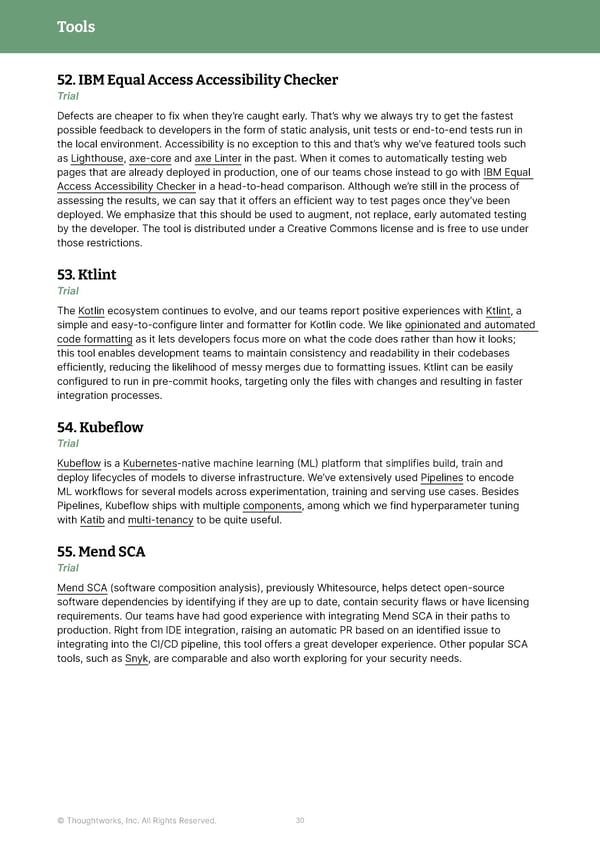Tools 52. IBM Equal Access Accessibility Checker Trial Defects are cheaper to fix when they’re caught early. That’s why we always try to get the fastest possible feedback to developers in the form of static analysis, unit tests or end-to-end tests run in the local environment. Accessibility is no exception to this and that’s why we’ve featured tools such as Lighthouse, axe-core and axe Linter in the past. When it comes to automatically testing web pages that are already deployed in production, one of our teams chose instead to go with IBM Equal Access Accessibility Checker in a head-to-head comparison. Although we’re still in the process of assessing the results, we can say that it offers an efficient way to test pages once they’ve been deployed. We emphasize that this should be used to augment, not replace, early automated testing by the developer. The tool is distributed under a Creative Commons license and is free to use under those restrictions. 53. Ktlint Trial The Kotlin ecosystem continues to evolve, and our teams report positive experiences with Ktlint, a simple and easy-to-configure linter and formatter for Kotlin code. We like opinionated and automated code formatting as it lets developers focus more on what the code does rather than how it looks; this tool enables development teams to maintain consistency and readability in their codebases efficiently, reducing the likelihood of messy merges due to formatting issues. Ktlint can be easily configured to run in pre-commit hooks, targeting only the files with changes and resulting in faster integration processes. 54. Kube昀氀ow Trial Kubeflow is a Kubernetes-native machine learning (ML) platform that simplifies build, train and deploy lifecycles of models to diverse infrastructure. We’ve extensively used Pipelines to encode ML workflows for several models across experimentation, training and serving use cases. Besides Pipelines, Kubeflow ships with multiple components, among which we find hyperparameter tuning with Katib and multi-tenancy to be quite useful. 55. Mend SCA Trial Mend SCA (software composition analysis), previously Whitesource, helps detect open-source software dependencies by identifying if they are up to date, contain security flaws or have licensing requirements. Our teams have had good experience with integrating Mend SCA in their paths to production. Right from IDE integration, raising an automatic PR based on an identified issue to integrating into the CI/CD pipeline, this tool offers a great developer experience. Other popular SCA tools, such as Snyk, are comparable and also worth exploring for your security needs. © Thoughtworks, Inc. All Rights Reserved. 30
 Immersive Experience — Vol 28 | Thoughtworks Technology Radar Page 29 Page 31
Immersive Experience — Vol 28 | Thoughtworks Technology Radar Page 29 Page 31